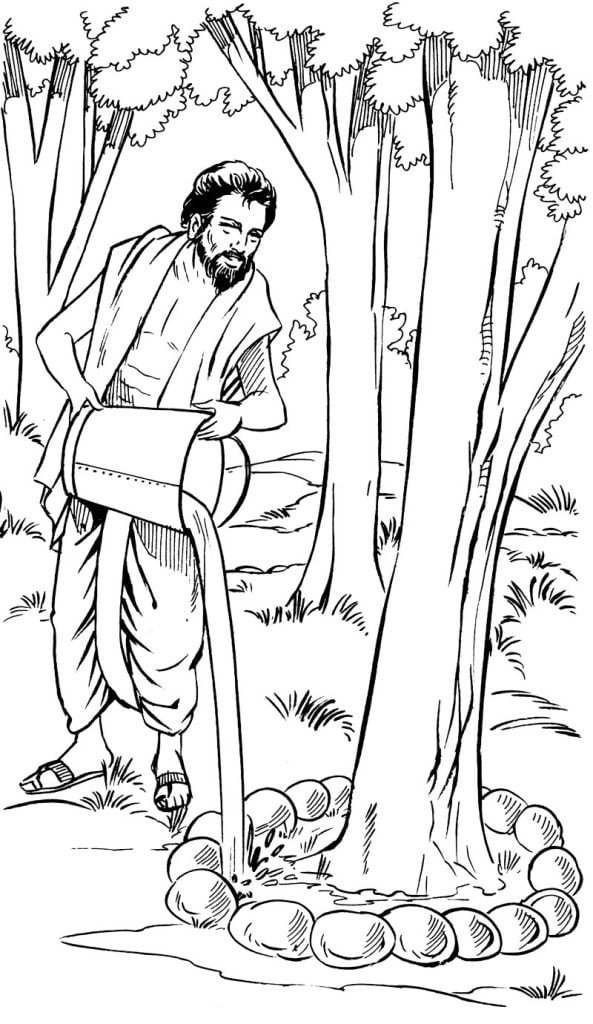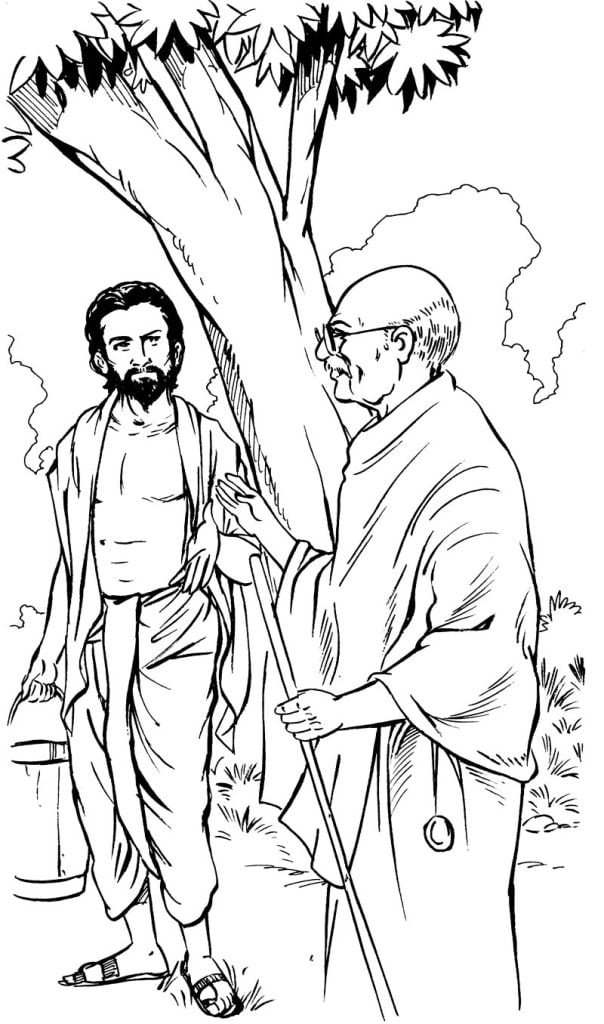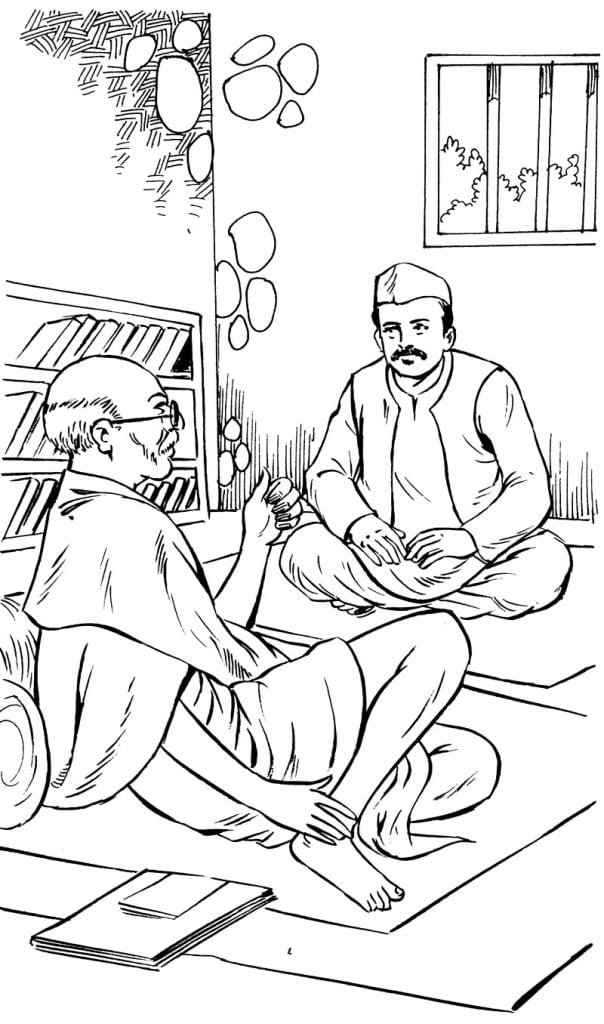Vinoba returned to Satyagraha Ashram on dot at the completion of one year break; Gandhiji remarked, “You had gone on as one year leave to further your study of Sanskrit. Exactly after one year you come back as promised. I had even forgotten that you were supposed to be back at this hour to honour your word.”
Vinoba busied himself without any fuss in the ashram duties. There was a small garden in the ashram premises. It had a good number of trees that needed regular watering. The water had to be fetched from ‘Sabarmati’ river some distance away. It was a very laborious job that took hours of bringing buckets of water from the river. Vinoba took charge of the job.
He toiled for six months watering the trees. Then, Vinoba shifted to the task of cooking food. There were no servants in the ashram. All the chores were done by the inmates. Normally the inmates volunteered for various tasks. That’s how the duties were apportioned.

Vinoba never shirked from any task that demanded manual labour. He would do his job with full dedication irrespective of the toil it took. He had a frail body but his spirit was strong and will-power fuelled him. Gandhiji used to look at Vinoba in amazement.
One day he could not help asking, “You have a skeleton for a body. Still how do you work so hard?”
Vinoba calmly revealed, “Only with will-power.’’
As the ashram was situated near the bank of river Sabarmati, it became more familiar as Sabarmati Ashram. ‘Satyagraha’ word really denoted ‘an endeavour of Gandhiji’. He had opened Satyagraha Ashrams at other places as well. The first one of the line was set up in Natal, S. Africa way back when he was there crusading for the rights of Indian settlers there.
The manager of Sabarmati Ashram, Bhai Maganlal was a man of principles and a strict disciplinarian. He saw to it that the inmates abided by the rules, regulations and the ideals of the ashram religiously. The harsh regimen was beyond the endurance power of the inmates. In ones and twos they began to leave the ashram. The exodus was worrying Bhai Maganlal. The number of the inmates (called workers) had dwindled alarmingly. The stayers were beginning to be burdened by additional duties.
Maganlal discussed the problem with Vinoba and asked if relaxations in rules and regulations was advisable.
Vinoba put his foot down. He said in a firm voice, “If they are going, let them go. There is no question of relaxing any rules. We can curtail some less necessary tasks and concentrate on essential duties. If a few people of true ideals remain that should be preferable to hundreds of softies with wavering minds.”
Maganlal liked the firmness of Vinoba Bhave.
The news of Vinoba’s presence in Sabarmati Ashram brought his younger brothers Balkoba and Shivaji to him. They too wanted to live with him as the two too were eager to do social service. Vinoba persuaded them to go back to the parents. But a few days later the two again come back to him. Their determination forced Vinoba to allow his brothers to serve in the ashram.
Later, it proved that Balkoba and Shivaji too were genuinely dedicated to service and ascetic life even more than the other inmates. It made Vinoba proud.
Ashram had ancient type latrines where the people eased themselves into tin trays. Later the sweeper would carry the trays with accumulated nightsoil to the riverside to empty them and bring back washed clean to put them back in the latrine cubicles. Once, the sweeper fell ill. He sent his 10-12 year old son to do the job.
The tray’s were full of the nightsoil making them too heavy for a kid to handle. The boy was trying to juggle with a tray finding it hard to move or lift it. He was in tears and started to cry in helplessness. Balkoba saw the dilemma of the poor kid. He took pity and lent a helping hand to the boy. Together they carried the trays to the river bank notwithstanding the unpleasantness of the task.
Balkoba was happy for helping a poor kid.
The other inmates watched it in shock and disgust. For them it was the filthiest deed only fit for the lowest of the untouchable castes. They ran to Vinoba and complained to him about his brother’s condemnable misdeed.
Gandhiji was then out of station. To the chagrin of the inmates, instead of rebuking Balkoba Vinoba called his brother and patted him on the back for doing a noble deed of helping out a poor kid.
He said, “Well done Balkoba! That is the way to serve poor, helpless, meek and sick.”
The workers (inmates) of the ashram did not like it at all. The word went around that Bhave brothers were a degenerated lot who deserved to be kicked out to save the sanctity of the place. They stopped taking food with Vinoba and his brothers.
Now Gandhiji was eagerly awaited. When he arrived at the ashram the offended workers lost no time in apprising Gandhiji of the disgusting act of Vinoba and his brothers and recommended their expulsion at once or they threatened that they would leave ashram.
Gandhiji heard the version of Vinoba and the truth behind Blakoba’s act.
Gandhiji declared, “Cleaning out nightsoil is no mean act. Infact it is noble. Now on, the sweeper will not clean the latrines. Every worker of my ashram will clean out his own nightsoil. Those who can’t live with it may leave the ashram.”
Many of the casteism infected people packed up their baggage and departed.
Meanwhile, a friend wrote a letter to Vinoba informing him of his mother’s terminal illness. Vinoba did not respond or react. Then, the friend wrote another letter to Gandhiji about the serious illness of Vinoba’s mother.
Gandhiji instructed Vinoba to go home at once and look after his ailing mother as his sacred duty. Vinoba obediently went home and found his mother in terminally weakened state of health.

Faithfully Vinoba put his head on the feet of his mother. She blessed him and asked, “Vinya! Why did you desert Gandhiji’s work?”
The mother although very weak but her voice retained the usual edge while talking to her saintly son. Vinoba did not utter a word and closed his eyes to silently seek the forgiveness of his loving mother who even in her illness was thinking of his duty to Gandhiji.
After a few days the mother passed away. He did not attend the funeral because he had become disenchanted with last rite rituals which appeared like a farce to an enlightened mind. He stayed home and read out scriptures for the peace of his mother’s soul.
The fact was that he wanted to perform the last rites of his mother himself. He knew all the procedures and rituals as he had read all the scriptures and understood the spiritual content. He could have done it with spiritual and emotional depth being devoted to his departed mother, whereas the purohits would do it as some formalities to be rushed through without any feeling, pocket the fees and go home.
The professional ritualists objected to Vinoba doing the last rites. The orthodox elements of the clan sided with the traditional purohits and Vinoba was pushed aside. Then Vinoba returned to the ashram.
Meanwhile, in the country Jalianwala Bagh massacre had happened where General O’Dyre had butchered several hundred innocents, thousands were maimed or injured. It had infuriated the nation and shocked the world. The revolutionary sparks were flying off all over. In August, 1920 Gandhiji started non-cooperation movement against the colonial rule.
At that time Vinoba was teaching in National School run by Sabarmati Ashram. Someone suggested, “The non-cooperation movement requires the services of a great person like you.”

Vinoba replied, “I am preparing the next generation for it. My job is in the coming generation and not in the present one.”
Independence movement was keeping Gandhiji mostly away from Ahmedabad. The ashram was in the trusted care of Vinoba and Maganlal. Seth Jamnalal Bajaj was a great admirer of Gandhiji. One day he suggested to him, “Bapu! I earnestly wish that you shift to Vardha to set up your ashram there.”
Gandhiji said, “Your suggestion is good. But you know I am a Gujarati. I will work better in Gujarat and serve the national cause from there.”
At that moment Jamnalal could not press the matter. Then, he noticed the discipline, spirit of sacrifice and committed dedication of Vinoba. He thought of taking him to Vardha. So, he put forward his proposal before Gandhiji, “Bapu, if you can’t come to Vardha, please spare Vinoba for us.”
After some thought Gandhiji agreed. So, Vinoba along with some associates, friends and students moved over to Vardha and set up Satyagraha Ashram.
Seth Jamnalal was already impressed with the saintly character of Vinoba. At Vardha he came into close contact with him and got so enamoured that he made Vinoba his guru.
Seth Jamnalal’s adoration of Vinoba never stopped growing. The more he interacted with Vinoba more devoted he became. He recounted the experience in his own word as—‘My devotion to Vinoba Bhave is growing day by day. I will feel redeemed if God made my mortal self worthy of devotion to him. My only wish is to make myself deserving of the love of Bapuji who is like father and guru Vinoba.”
The main objective of Vardha Ashram was to train workers for the national service which in practical reality meant freedom struggle. The workers were infused with a patriotic spirit. For this Vinoba had listed 11 points the workers were supposed to follow religiously. The point were—Non-violence, Truth, Non-thievery, Celibacy, Frugality, Physical labour, No salt or spices in food, Secularism, Swadeshi (Boycott of foreign goods) and Untouchability removal.
He had woven these principles in a Sanskrit quartet which he created after some intellectual exercise. Later, the quartet was included for singing in the morning and evening prayers.
For joining the ashram there was no gender or caste discrimination. Only thing that mattered was discipline, piety and adherence to above principles.
Sabarmati and Vardha ashrams functioned independently yet in spirit, principles, aims and objectives they were inseparable.
The education syllabus of the ashram was divided in seven categories:
- Religious Education—Fasting, praying, read-ing sacred literature and discourses.
- Industrial Education—Spinning, weaving, masonry, sewing, farming etc.
- Linguistic Education—Sanskrit, Hindi, regio-nal mother tongue.
- Social Education—Political Science, Socio-logy, Economics, History etc.
- Practical Education—Arithmetic, Account-ancy, Geography, Science etc.
- Arts Education—Music, Graphics, Painting, Literature etc.
- Physical Education—Cooking, Fetching water, Grinding on mill stones, Exercises, Medicines, Cleaning etc.
The life of inmates was ruled by daily regimen.
The rules and regulations were strictly applied in the ashram. There was no room for dawdling. The regimen was so severe that many lasted only just till lunch. Some made it to the supper before fleeing. Only the determined ones made of sterner stuff stayed on. Thus, the place was never crowded.
A writer who had studied the character of Vinoba for a long time later wrote—
‘I saw Vinoba for the first time in 1928. Then his language was not polite as it is today. He was laconic…severe disciplinarian…would talk only in monosyllables. The workers used to fear to talk to him. Wherever he went silence followed. All the chores of ashram used to be done by hands. No exceptions and no irregularity. Any error would invite the wrath of Vinoba.
No wonder most of the workers who landed there is initial enthusiasm soon got the fright of Vinoba’s penchant for immaculate discipline and frugality.

